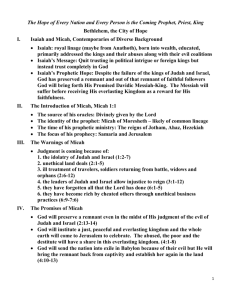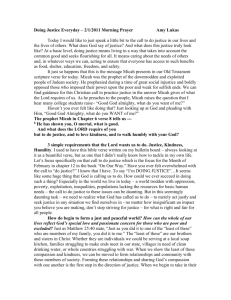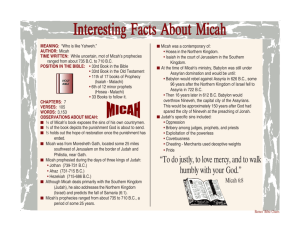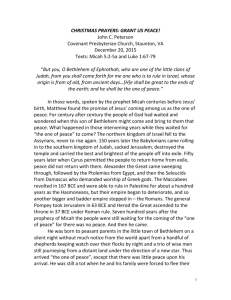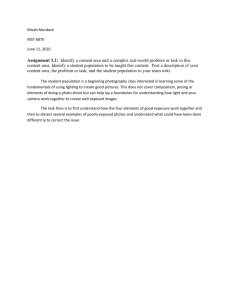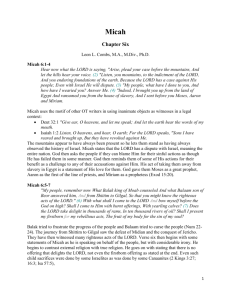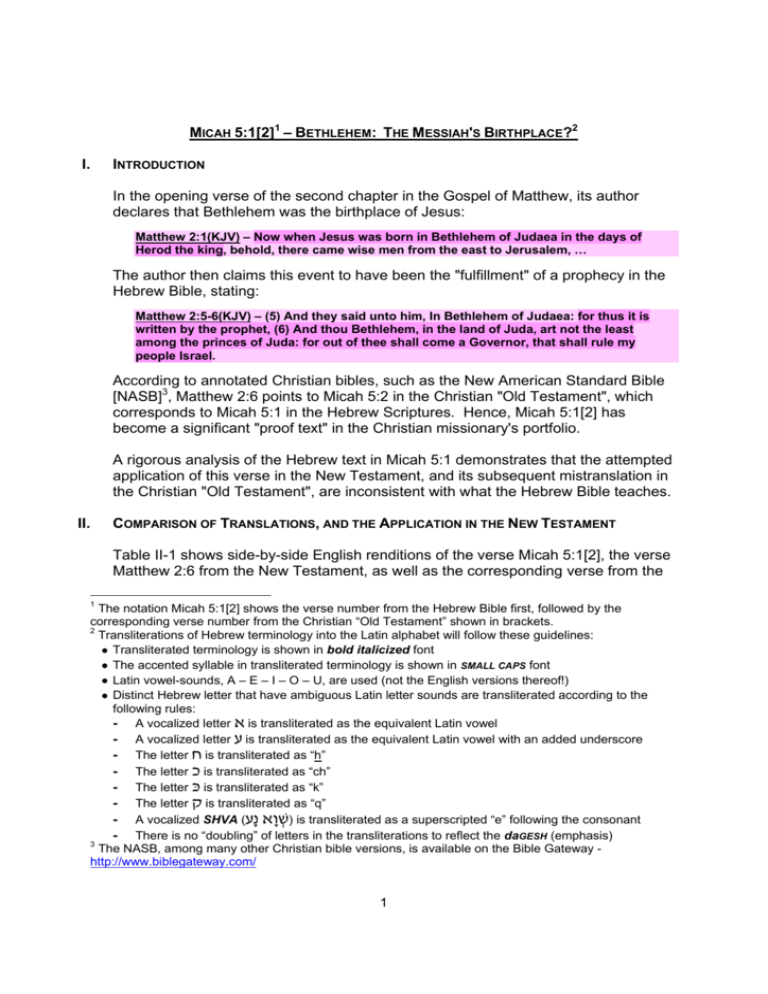
MICAH 5:1[2]1 – BETHLEHEM: THE MESSIAH'S BIRTHPLACE?2
I.
INTRODUCTION
In the opening verse of the second chapter in the Gospel of Matthew, its author
declares that Bethlehem was the birthplace of Jesus:
Matthew 2:1(KJV) – Now when Jesus was born in Bethlehem of Judaea in the days of
Herod the king, behold, there came wise men from the east to Jerusalem, …
The author then claims this event to have been the "fulfillment" of a prophecy in the
Hebrew Bible, stating:
Matthew 2:5-6(KJV) – (5) And they said unto him, In Bethlehem of Judaea: for thus it is
written by the prophet, (6) And thou Bethlehem, in the land of Juda, art not the least
among the princes of Juda: for out of thee shall come a Governor, that shall rule my
people Israel.
According to annotated Christian bibles, such as the New American Standard Bible
[NASB]3, Matthew 2:6 points to Micah 5:2 in the Christian "Old Testament", which
corresponds to Micah 5:1 in the Hebrew Scriptures. Hence, Micah 5:1[2] has
become a significant "proof text" in the Christian missionary's portfolio.
A rigorous analysis of the Hebrew text in Micah 5:1 demonstrates that the attempted
application of this verse in the New Testament, and its subsequent mistranslation in
the Christian "Old Testament", are inconsistent with what the Hebrew Bible teaches.
II.
COMPARISON OF TRANSLATIONS, AND THE APPLICATION IN THE NEW TESTAMENT
Table II-1 shows side-by-side English renditions of the verse Micah 5:1[2], the verse
Matthew 2:6 from the New Testament, as well as the corresponding verse from the
1
The notation Micah 5:1[2] shows the verse number from the Hebrew Bible first, followed by the
corresponding verse number from the Christian “Old Testament” shown in brackets.
2
Transliterations of Hebrew terminology into the Latin alphabet will follow these guidelines:
Transliterated terminology is shown in bold italicized font
The accented syllable in transliterated terminology is shown in SMALL CAPS font
Latin vowel-sounds, A – E – I – O – U, are used (not the English versions thereof!)
Distinct Hebrew letter that have ambiguous Latin letter sounds are transliterated according to the
following rules:
- A vocalized letter אis transliterated as the equivalent Latin vowel
- A vocalized letter עis transliterated as the equivalent Latin vowel with an added underscore
- The letter חis transliterated as “h”
- The letter כis transliterated as “ch”
- The letter כּis transliterated as “k”
- The letter קis transliterated as “q”
- A vocalized SHVA ( ) ְשׁוָ א נָעis transliterated as a superscripted “e” following the consonant
- There is no “doubling” of letters in the transliterations to reflect the daGESH (emphasis)
3
The NASB, among many other Christian bible versions, is available on the Bible Gateway http://www.biblegateway.com/
1
Hebrew Bible, Micah 5:1. Matthew 2:6 is included since it contains the alleged quote
from Micah 5:1[2].
Table II-1 – Comparing Matthew 2:6 with Micah 5:1[2]
King James Version
New Testament
Matthew 2:6
And thou Bethlehem,
in the land of Juda, art
not the least among
the princes of Juda:
for out of thee shall
come a Governor, that
shall rule my people
Israel. -------------------------------------------------
King James Version
"Old Testament"
Micah 5:2
But thou, Bethlehem
Ephratah, though thou be
little among the thousands
of Judah, yet out of thee
shall he come forth unto
me that is to be ruler in
Israel; whose goings forth
have been from of old,
from everlasting.
Jewish Translation from
the Hebrew
Micah 5:1
And you, [of] Bethlehem
[of] Efrat, who were to be
insignificant among the
thousands of Judah, from
you [he] shall emerge for
Me, to be a ruler over
Israel; and his origin is
from old, from ancient
days.
Hebrew Text
א,מיכה ה
וְ אַ ָתּה בֵּ ית־לֶחֶ ם
אֶ פְ ָרתָ ה צָ עִ יר לִ ְהיוֹת
הוּדה ִמ ְמּ
ָ ְבְּ אַלְ פֵ י י
לִ י יֵצֵ א לִ ְהיוֹת מו ֵֹשׁל
בְּ יִ ְשׂ ָראֵ ל וּמוֹצָ אֹתָ יו
ִמ ֶקּ ֶדם ִמימֵ י ע ֹולָם׃
Aside from the fact that Matthew 2:6 is, at best, a paraphrase of the quoted portion
of the source verse, of which the last phrase was completely left out, the rendition of
Micah 5:2 in the KJV is problematic. These issues, which involve the highlighted
phrases in the respective texts, are addressed in the analysis.
III.
ANALYSIS OF THE PASSAGE
The Jewish translation of Micah 5:1 is separated into the following two segments in
order to facilitate the analysis:
Segment A
Micah 5:1A – And you, [of] Bethlehem [of] Efrat, who were to be insignificant among the
thousands of Judah, from you [he] shall emerge for Me, to be a ruler over Israel;
Segment B
Micah 5:1B – and his origin is from old, from ancient days.
A. Analysis of Segment A
The main object of analyzing this portion of the verse is to identify whom the
prophet may be addressing here. The loss of various gender distinctions in the
process of translating this passage from Hebrew into English makes it nearly
impossible to obtain a correct identification when using an English translation
without also studying the Hebrew text.
Micah 5:1A – And you, [of] Bethlehem [of] Efrat, who were to be insignificant among
the thousands of Judah, from you [he] shall emerge for Me, to be a ruler over Israel;
The opening phrase in the verse, ( וְ אַ ָתּה בֵּ ית־לֶחֶ ם אֶ פְ ָרתָ הveaTAH BEIT-LEhem
efRAtah), starts with the word ( וְ אַ ָתּהveaTAH), which is a combination of ְ( וve),
the conjunction and, and ( אַ ָתּהaTAH), the pronoun you for the 2nd-person,
2
singular, masculine gender, and which also is the noun in this case. Thus, וְ אַ ָתּה
(veaTAH) translates as and you, in the 2nd-person, singular, masculine gender.
Following the word וְ אַ ָתּהis the phrase ( בֵּ ית־לֶחֶ ם אֶ פְ ָרתָ הBEIT-LEhem
efRAtah). The term ( אֶ פְ ָרתָ הefRAtah) is used in the Hebrew Bible in several
ways:
אֶ פְ ָרתָ הis the name of a place, ( אֶ פְ ָרתefRAT), to which the syllable ( ָהah) had
been appended. The appendage of the syllable ָהto the name of a place in the
Hebrew Bible most often is equivalent to adding the proposition “to” to the name, i.e.,
to [name of the place]; thus, תה
ָ אֶ פְ ָרwould translate as to Efrat (e.g., at Genesis
35:16,19, 48:7; similar cases occur for other cities, such as Jerusalem [e.g., at
2Chronicles 32:9], Hebron [e.g., at 2Samuel 5:1], as well as other places that are not
necessarily where people live, such as a well [e.g., at Genesis 24:16]).
ָהhas the effect of adding the preposition
“of/from” to the name, i.e., of/from [name of the place]. In this case, אֶ פְ ָרתָ ה
would translate as of/from Efrat (e.g., at 1Chronicles 2:24, where בְּ כָ לֵב אֶ פְ ָרתָ ה
In some cases, the appended syllable
(bechaLEV efRAtah), translates as in Calev of Efrat). This application suggests the
possibility that Efrat may have also been the name of a district or region, such as a
metropolis or township, which included other places in addition to Efrat itself, as the
following verse may indicate:
Ruth 4:11 - And all the people who were in the gate and the elders replied, "[We
are] witnesses! May the Lord make the woman who is entering your house like
Rachel and like Leah, both of whom built up the House of Israel; and [may you]
prosper in Ephrathah and be famous in Bethlehem.
It is the name of a place, a city, also called אֶ פְ ָרת, which is another name for the city
of בֵּ ית־לֶחֶ ם, Bethlehem, as the common translations of the following verse may
indicate:
Genesis 48:7 - As for me, when I came from Padan, Rachel died on me in the land
of Canaan on the way, when there was still a stretch of land to go to Efrat, and I
buried her there on the way to Efrat, which is Bethlehem. (See also Genesis 35:19.)
Sidebar Note: There could be an issue here with the manner in which the Hebrew
in this verse, as well as in Genesis 35:19, is read and understood, which may impact
the translation as well. One can quite easily understand this verse to read in the
following manner:
Genesis 48:7 - As for me, when I came from Padan, Rachel died on me in the land of
Canaan on the way, when there was still a stretch of land to go to Efrat, and I buried
her there on the way to Efrat, which is [in] Bethlehem.
The original verse unambiguously states that Jacob buried Rachel at some point,
characterized in the verse as “there”, which was still some distance from Efrat itself.
Therefore, the last phrase could easily be understood as referring to the place where
Jacob buried Rachel.
If this argument is valid, it could actually change the claim that these two names refer
to the same place.
3
In the Hebrew language, which has no neuter gender (i.e., there is no Hebrew
equivalent to the English pronoun it), cities and towns are assigned the feminine
gender. This is also the case, without exceptions, for any city or town mentioned
in the Hebrew Bible. It is important to recognize the distinction between a
geographical patch of real-estate that bears the name of a city or town and its
inhabitants, since there are instances in the Hebrew Bible where the population
of a city or town is referred to by the name of that place, but in a masculine
gender, which could appear to someone who may not be sufficiently proficient in
the Hebrew language as if the city or town itself were referred to in the masculine
gender [e.g., Isaiah 3:8, Ezekiel 25:9, 38:6, Amos 5:5, Micah 1:11]. The use of
the pronoun אַ ָתּה, [singular, masculine] you, would not be an issue in this case
since, in the Hebrew Bible, singular pronouns, such as אַ ָתּה, are applied in both
the singular and plural context (e.g., Exodus 33:3).
The phrase בֵּ ית־לֶחֶ ם אֶ פְ ָרתָ הis an example of an appositive, an element of a
sentence that further identifies the noun – אַ ָתּהin this case, which is the
[singular, masculine] pronoun you – yet cities and towns are feminine objects.
Therefore, this phrase cannot refer to a city or town.4
ָ ְצָ עִ יר לִ ְהיוֹת ְבּאַלְ פֵ י י, (tsa’IR lihYOT bealFEI yehuDAH), is
The next phrase, הוּדה
an adjective clause, which is a clause that describes the noun. The first term in
this phrase, ( צָ עִ ירtsa’IR), is a masculine adjective (it can also serve as a noun),
the feminine counterpart of which is ירה
ָ ִ( ְצעtseiRAH). This adjective (noun) is
used in the Hebrew Bible exclusively in reference to people, never in reference to
places. Its most common application is in referring to a young person (e.g.,
Jeremiah 14:3, Job 32:6) and to the younger of two persons (e.g., Genesis
29:26). This term is also used in the Hebrew Bible as a metaphor to describe
persons who are of lower rank or stature, insignificant, or lowly relative to
others (e.g., 1Samuel 9:21, Psalms 119:141).
ָ ְ( בְּ אַלְ פֵ י יbealFEI yehuDAH).
The word צָ עִ ירis followed by the expression הוּדה
The Hebrew word ( אֶ לֶףElef), a thousand, appears in this expression in a plural
possessive construct, namely, ( אַלְ פֵ יalFEI), thousands of …, combined with the
preposition ( בְּ ־be-), among, in, within, so that the expression translates as
among the thousands of …. Recall how Moses divided the Israelites into
groups of thousands, first according to their tribal affiliation and then by clans,
ָ (saREI alaFIM)], and
over which he placed “captains of thousands” [שׂ ֵרי אֲ לָפִ ים
further divided each thousand into subgroups of hundreds, over which he placed
“captains of hundreds” [מאוֹת
ֵ ( ָשׂ ֵריsaREI mei’OT)] (see Exodus 18:25).
According to accounts in the Hebrew Bible, such divisions remained in place for
the Kingdom of Israel through King Solomon’s reign (see 2Chronicles 1:2), and
4
If it were the town of Bethlehem being addressed in Micah 5:1, the opening term would have been וְ אַ ְתּ
(veAT), and you, in the 2nd-person, singular, feminine gender, such as at Jeremiah 3:1 and elsewhere.
4
for the Kingdom of Judah at least through King Amaziah’s reign (see 2Chronicles
25:5). The Hebrew Bible contains 28 references to the “captains of thousands”
and ten applications of the plural possessive construct אַלְ פֵ יthat could be
understood to relate to the groups of “thousands” among Israel, the latter of
which are shown in Table III.A-1 along with their common Jewish translations
and KJV translations [the phrases shown in the brackets are included to help with
the context].
Table III.A-1 – Applications of אַלְ פֵ יrelative to the groups of “thousands” among Israel
Common Jewish
KJV Translation
Translation
my thousand [is the
my family [is poor in
אַלְ פִּ יalPI
Judges 6:15
poorest in Menasseh]
Manasseh]
[the heads of the]
[heads of] thousands in
Numbers 1:16
thousands of [Israel]
[Israel]
[the leaders of Israel's] [heads of the]
Numbers 10:4
thousands
thousands of [Israel]
[the heads of the]
[the heads of the]
אַלְ פֵ יalFEI
Joshua 22:21
thousands of [Israel]
thousands of [Israel]
[the heads of the]
[heads of the]
Joshua 22:30
thousands of [Israel]
thousands of [Israel]
[among the] thousands [throughout all the]
1Samuel 23:23
of [Judah]
thousands of [Judah]
among the thousands among the thousands
e
בְּ אַלְ פֵ יb alFEI
Micah 5:1[2]*
of [Judah]
of [Judah]
among the thousands
among the thousands
e
Joshua 22:14
לְ אַלְ פֵ יl alFEI
of [Israel]
of [Israel]
from the thousands of
out of the thousands of
e
ְמאַלְ פֵ יm alFEI
Numbers 31:5
[Israel]
[Israel]
וּלְ אַלְ פֵ יכֶ םu’lealfeiCHEM 1Samuel 10:19 and by your thousands and by your thousands
* - This case is included here conditionally for the benefit of the discussion that follows.
Hebrew
Pronunciati
on
Reference
The analysis presented thus far is sufficient to develop several possible
scenarios to describe whom Micah might be addressing in the opening verse.
1. Who is being addressed by Micah?
Scenario 1
One possibility is that Micah is addressing the inhabitants of the city
בֵּ ית־לֶחֶ ם, Bethlehem. The added reference to Efrat could help identify the
city as the one located in the territory of Judah so as to distinguish it from
another Bethlehem located in the territory of Zebulun (see Joshua 19:15),
though it is superfluous as seen from the rest of Segment A. The inhabitants
of בֵּ ית־לֶחֶ םmay have comprised one of those groups of “thousands” in the
Hebrew Bible, one that had a low status among the other “thousands” in the
Tribe of Judah. Yet, in spite of its insignificance, Micah prophesies that out of
this “thousand” ַ( מָ ִשׁיחmaSHI'ah), the promised Jewish Messiah, will
emerge.
5
A drawback of this scenario is that the population of בֵּ ית־לֶחֶ םprobably was
large enough to comprise more than one such clan of a “thousand”.
Scenario 2
A second possibility is that a certain clan from Efrat, i.e., a group of families
that trace their lines of decent to a common ancestor, is being addressed
here. In Hebrew, the name ( בֵּ ית־לֶחֶ םBEIT-LEhem) literally means [the]
House of Lehem [( לֶחֶ םLEhem) means bread, or (generic) food]. Thus, the
title בֵּ ית־לֶחֶ םmay refer to a clan by that name who resides in Efrat. The
members of this clan may have comprised one of the groups of “thousands”
but, again, one that had a low status among the other “thousands” in the Tribe
of Judah. Here, too, Micah prophesies that, in spite of its insignificance,
ַ מָ ִשׁיחwill emerge out of this clan.
This scenario draws support from the fact that members of a clan or a family
are referred to by the name of their clan or family, names that often derive
from the names of their respective progenitors, as the following example
demonstrates:
Numbers 3:19,27 – (19) And the sons of Kohath according to their families were
Amram, Itzhar, Hebron, and Uziel.
(27) And of Kohath, the Amramite family, and the Izharite family, and the Hebronite
family, and the Uzzielite family; these are the Kohathite families.
This may also be seen regarding the Bethlehemite clan [ַח ִמי
ְ ( בֵּ ית־הַ לּBEITha'lahMI)] in the following example:
1Samuel 16:1 - And the Lord said to Samuel, "Until when will you mourn for Saul,
that I have rejected him from reigning over Israel? Fill your horn with oil, and go, I
will send you to Jesse the Bethlehemite [ַח ִמי
ְ ]בֵּ ית־הַ לּ, for I have found among his
sons a king for Me.
By slightly changing its common English translation, the following verse could
demonstrate this even more explicitly:
1Samuel 17:12 - And David was the son of this Ephratite man [( אֶ פְ ָר ִתיefraTI)] from
the House of Lehem [( ִמבֵּ ית־לֶחֶ םmi'BEIT-LEhem)] of Judah, whose name was
Jesse, and he had eight sons; and the man, who was elderly in Saul's time, was
among the [respected] men.
A drawback of this scenario is that no person named לֶחֶ םis mentioned
anywhere in the Hebrew Bible. One would expect that, if there was a clan
named – בֵּ ית־לֶחֶ םone that was destined to become so significant in Israel –
the name of its progenitor would have been mentioned somewhere in the
Hebrew Bible.
6
Scenario 3
A third possibility is similar to the one described above in Scenario 2, except
that here Micah addresses some unnamed group of people, perhaps a clan
that hails from בֵּ ית־לֶחֶ םand either comprised or was part of a “thousand”,
one that had a low status among the other “thousands” in the Tribe of Judah.
Once again, as in the previous two scenarios, Micah prophesies that ַמָ ִשׁיח
will emerge out of this clan even though it was lowly.
This scenario suffers from a drawback that is similar to that noted for
Scenario 2. Namely, that a clan of a “thousand”, or a group of people within
it, destined for future greatness, is being addressed anonymously.
Scenario 4
Lastly, it is possible that being addressed here is a particular individual whose
ancestors, and he himself, hail from בֵּ ית־לֶחֶ ם. This person was insignificant
in his youth, but was the one whom God selected to be the king of Israel and
the progenitor of the royal lineage out of which ַ מָ ִשׁיחwould eventually
emerge.
In spite of the apparent anonymity, several accounts found elsewhere in the
Hebrew Bible fit into the characterization provided by Micah and help identify
this special individual. This person turns out to be David, who was the one
son that Jesse regarded the least when God dispatched Samuel to find and
anoint the next king of Israel:
1Samuel 16:1,6-12 – (1) And the Lord said to Samuel, "Until when are you
mourning for Saul, when I have rejected him from reigning over Israel? Fill your
horn with oil, and come, I shall send you to Jesse, the Bethlehemite, for I have
seen for Myself a king among his sons."
(6) And it was, that when they came, and he saw Eliab, that he said, "Surely, before
the Lord is His anointed." (7) And the Lord said to Samuel, "Look not upon his
appearance, or the height of his stature, for I have rejected him, for it is not as man
sees, [that which is visible] to the eyes, while the Lord sees into the heart." (8) And
Jesse called to Abinadab, and he presented him before Samuel, and he said,
"Neither has the Lord chosen this one." (9) And Jesse presented Shammah, and he
said, "Neither has the Lord chosen this one." (10) And Jesse presented seven of
his sons before Samuel; and Samuel said to Jesse, "The Lord has not chosen
these." (11) And Samuel said to Jesse, "Are these all the young men?" And he
said, "The youngest still remains, and behold, he is tending the sheep." And
Samuel said to Jesse, "Send and bring him, for we shall not sit down until he
comes here." (12) And he sent and brought him, and he was ruddy, with beautiful
eyes, and handsome appearance. And the Lord said, "Arise, anoint him, for this is
he."
Eventually, the aging King David was visited by the Prophet Nathan who
conveyed to him God’s promise of an everlasting dynasty, of which he was to
be the progenitor, a dynasty that will eventually produce ַמָ ִשׁיח:
7
2Samuel 7:12-16 – (12) When your days are fulfilled, and you shall lie with your
forefathers, then I will raise up your seed that shall issue from your body after you,
and I will establish his kingdom. (13) He shall build a house for My Name, and I will
establish the throne of his kingdom forever. (14) I will be to him a father, and he
shall be to Me a son; so that when he goes astray I will chasten him with the rod of
men, and with afflictions of human beings. (15) And My mercy shall not depart
from him; in the manner in which I withdrew it from Saul, whom I removed from
before you. (16) And your house and your kingdom shall be established forever
before you; your throne shall be established forever.
All four scenarios presented above are, in principle, plausible, though
Scenario 4 provides the best “fit” with the written text. However, for the
purpose of this essay, it is not necessary to further analyze these scenarios.
The analysis of Segment A has demonstrated, first and foremost, that the
Prophet Micah is directing a prophetic message at a person (or a group of
persons) who hailed from Bethlehem, not at a parcel of land that bears the name
of the city, in which he foretells that the royal line that originated in Bethlehem will
eventually produce ַמָ ִשׁיח. Nothing is said about ַ מָ ִשׁיחbeing born in Bethlehem!
By contrast, the KJV translation uses Micah 5:2 to create a different prophetic
scenario wherein the city of Bethlehem, in spite of being a small and insignificant
place in the territory of Judah (for which no reason is given), will be the birthplace
of the Christian Messiah. Most other Christian translations do the same thing.
B. Analysis of Segment B
Micah 5:1B – and his origin is from old, from ancient days.
The fact that Segment A of Micah 5:1 actually voids the positive identification (in
the New Testament) of Bethlehem as the (Christian) Messiah’s birthplace,
created a serious problem for Christianity, one that is compounded by the
Hebrew closing phrase of Segment B, ( ִמימֵ י ע ֹולָםmi'y'MEI oLAM), from
ancient days.
Micah, a contemporary of the prophets Amos, Hosea, and Isaiah, and of King
Hezekiah (around 730 B.C.E.), said something special here, namely, that the
origin of ַ מָ ִשׁיחwould be from Bethlehem, from the long ago past, from ancient
days. However, this statement conflicts with Christian theology, since Jesus is
considered as having existed from the beginning of time, from before Creation,
and the phrase “from ancient days” does not satisfy this criterion. In order to "fix"
this problem, many Christian translators simply replace the correct phrase,
“ancient days”, with phrases such as “days of eternity”, “everlasting”, or “days of
time indefinite”.
Who is telling the truth? The Hebrew phrase ( יְ מֵ י ע ֹולָםyeMEI oLAM), ancient
days, is used at Micah 5:1 with the preposition ( ִמmi-), from, as ִמימֵ י ע ֹולָם. All
six instances of the expression יְ מֵ י ע ֹולָםin the Hebrew Bible, including its
8
combinations with prepositions, are shown in Table III.B-1, along with their
correct renditions and their renditions in the KJV.
Table III.B-1 – The expression ע ֹולָם
יְ מֵ יin the Hebrew Bible
Hebrew
Pronunciation
Reference
יְ מֵ י ע ֹולָם
yeMEI oLAM
Isaiah 63:9,11 the days of old
Amos 9:11;
Micah 7:14;
as in days of old
Malachi 3:4
Micah 5:1[2] from ancient days
כִּ ימֵ י ע ֹולָם
kiy’MEI oLAM
ִמימֵ י ע ֹולָם
miy’MEI oLAM
Correct Translation
KJV Rendition
the days of old
as in the days of old
from everlasting
The KJV correctly translates this expression in five out of the six cases as “days
of old”, which is synonymous with “ancient days”, but at Micah 5:2 the KJV
renders it as “from everlasting”.
What could have motivated the KJV translators to change the translation at
Micah 5:2, which speaks of the Messiah? A likely answer is that, by substituting
“from everlasting” for “from ancient days”, the KJV translators attempted to bring this
"Old Testament" prophecy into “harmony” with the accounts in the New
Testament and with Christian theology. Could this be another example of "pious
fraud" committed by some Christian authors?
For the sake of completeness and fairness, it should be noted that, in contrast to
the KJV (and several other Christian bibles), some Christian translations have
the correct renditions of this phrase (e.g., New American Bible [NAB], New
International Version [NIV], New Revised Standard Version [NRSV], and The
New Jerusalem Bible, among others).
C. What’s wrong with Matthew 2:6?
As was demonstrated above, the phrase “from ancient days” brings the reader
back to King David and his ancestors, and this created a serious theological
problem for Christianity. It was also shown how the KJV translators attempted to
"solve" this problem in their rendition of Micah 5:2. The author of the Gospel of
Matthew apparently recognized this problem as he was attempting to construct a
cohesive message, and his creative way of dealing with the true context of Micah
5:1[2] was to simply restate his own version of this verse:
Matthew 2:6(KJV) – And thou Bethlehem, in the land of Juda, art not the least among
the princes of Juda: for out of thee shall come a Governor, that shall rule my people
Israel.
Table III.C-1 shows a word-by-word (or, as appropriate, phrase-by-phrase)
comparison of the four texts shown in Table II-1 at the beginning of this essay
along with related comments on any discrepancies relative to the Hebrew text.
[The notations [M] and [F] indicate the respective genders – masculine and
feminine – in the Hebrew text. The notation [N] indicates a term that is gender-
9
neutral, such as the infinitive of a verb in lines 5 and 11, and the preposition
inflected in the 1st-person singular in line 9, of the table.]
Table III.C-1 – Word-by-word comparison of the texts
Matthew 2:6
(KJV)
#
Micah 5:2
Micah 5:1
(KJV)
(Jewish)
But thou (different; “But”
And you [of]
replaces “And”)
Bethlehem
Bethlehem
1
And thou
2
Bethlehem
3
in the land of Juda (different) Ephratah
little (different; can
not the least (different; note
apply to people and
reversal of context)
places)
art (different; change of
though thou be
context)
4
5
א,מיכה ה
[M]
[F]
[F]
וְ אַ ָתּה
בֵּ ית־לֶחֶ ם
אֶ פְ ָרתָ ה
Insignificant
[person(s)]
[M]
צָ עִ יר
who were to be
[N]
לִ ְהיוֹת
[M]
בְּ אַלְ פֵ י
הוּדה
ָ ְי
ִמ ְמּ
לִ י
יֵצֵ א
לִ ְהיוֹת
מו ֵֹשׁל
בְּ יִ ְשׂ ָראֵ ל
וּמוֹצָ אֹתָ יו
ִמ ֶקּ ֶדם
[of] Efrat
6
among the princes of
among the thousands of
7
Juda
Judah
among the
thousands of
Judah
8
for out of thee
yet out of thee
from you
9
(completely left out)
unto me
for Me
10 shall come
shall he come forth
[he] shall emerge
11 (completely left out)
a Governor (different; note
12
the “G”)
13 that shall rule my people Israel
that is to be
to be
[M]
[M]
[N]
[M]
[N]
ruler
a ruler
[M]
in Israel
whose goings forth have
been
from of old
from everlasting
(different; note change
in timeline)
over Israel
[M]
and his origin is
[M]
from old
[M]
from ancient days
[M] ִמימֵ י ע ֹולָם
14 (completely left out)
15 (completely left out)
16 (completely left out)
With the help of several “editorial” changes, as shown in the column for Matthew
2:6, Segment A was rather easily transformed into a passage that could show
Bethlehem as being the Messiah’s birthplace. This made it "line up" with the rest
of the story that the author of the Gospel of Matthew wanted to convey.
Segment B, on the other hand, is disastrous to Christian theology, which called
for “radical surgery” by the author of the Gospel of Matthew – he completely
eliminated this problematic part of Micah 5:1[2] from Matthew 2:6. After all, had
he included some modified version of Segment B, it may have drawn the reader
to the person who lived some 200-300 years prior to Micah on the historical
timeline, to King David, as the progenitor of the lineage from which the Messiah
would emerge. That would have eliminated Jesus’ divinity at the very least!
Once these changes were made, the resulting passage, Matthew 2:6, appeared
to be, and is claimed as being, one of several hundred prophecies in the
Christian “Old Testament” that has been fulfilled by Jesus per the accounts in the
10
New Testament. Yet, given the analysis presented above, how can any honest
reader accept this sort of manipulation at face value?
IV.
NEWS FLASH!!! ANOTHER BETHLEHEM
Archaeological evidence has recently been reported, in which another, more likely,
birthplace of Jesus was identified.5 Aviram Oshri, a senior archaeologist with the
Israeli Antiquities Authority, has been excavating in the area of an Israeli village
called Beit Lehem haGalilit, Bethlehem of the Galilee, which is located a few
miles west of Nazareth. This Bethlehem is mentioned in the Hebrew Bible as being
in the territory of the Tribe of Zebulun, which included the lower Galilee (see Joshua
19:15). From his findings, Oshri concludes that Jesus was born in Bethlehem of the
Galilee, not in Bethlehem of Judea.
The prospect of Jesus being born in the Galilee rather than in Judea creates serious
problems for Christian theology in general, and for the claim of Jesus being from the
"House of David" in particular, since Bethlehem of the Galilee was not part of Judea.
A more detailed analysis on the archaeological findings at Bethlehem of the Galilee
and their possible implications to Christian beliefs appears in another essay.6
V.
SUMMARY
Is Micah 5:1[2] a prophecy that ַ מָ ִשׁיחwill be born in Bethlehem (of Judea)? The
Christian claim is that Jesus fulfilled this prophecy by being born in Bethlehem of
Judea. As was demonstrated in the analysis presented herein, Bethlehem of Judea
was the town from which King David's family originated, and this prophecy speaks of
this city as the place where the messianic royal line originated, though not
necessarily the birthplace of ַמָ ִשׁיח. This passage is all about King David's ancestry,
with ַ מָ ִשׁיחbeing but a future "by-product" of it. It is interesting to note, and
somewhat surprising, that the translators of The New Jerusalem Bible (a Christian
bible translated and used by the Roman Catholic Church) confirm this in a footnote
to the verse Micah 5:2 (emphasis added by me):
Ephratha (to which Micah apparently attaches the etymological meaning of “fruitful”,
connecting it with the birth of the liberator) originally indicated a clan related to Caleb, 1
Ch 2:19,24,50, and settled in the district of Bethlehem, Rt 1:2; 1 S 17:12; the name later
came to be used for the town itself, Gn 35:19; 48:7; Jos15:59; Rt 4:11, hence the gloss in
the text. Micah is thinking of the ancient origin of the dynasty of David, Rt 4:11,17,18-22; 1
S 17:12. The evangelists later interpreted this passage as a prophecy of Christ’s
birthplace.”7
5
Aviram Oshri, “Where Was Jesus Born?”, Archaeology, Volume 58, No. 6, Nov/Dec 2005, pp. 42-45.
[Abstract of article is available at - http://www.archaeology.org/0511/abstracts/jesus.html]
6
O Little Town of Bethlehem … (of Galilee) - http://thejewishhome.org/counter/galilee.pdf
7
The New Jerusalem Bible, p. 1551, Doubleday (1985)
11
In other words, while this passage does not rule out Bethlehem of Judea from being
the birthplace of the Messiah, as could be any other place, the notion that it IS his
birthplace was introduced later, in the New Testament, as an interpretation by the
Gospel writers.
Since the KJV translation of the Hebrew Bible came many centuries after the Gospel
of Matthew was written, the only option available to the Christian translators for
"harmonizing" Micah 5:1[2] with Christian theology and Matthew 2:6 was to suitably
alter the context of the source verse. The discrepancies that exist between Matthew
2:6 and Micah 5:2 (in the Christian “Old Testament”) are not likely to be noticed by
most Christians since they generally study the New Testament first, which is where
their theological ideas become well established. By the time they proceed to study
the Christian "Old Testament" to “check out” these alleged prophecies of which the
accounts of fulfillment have already been studied, those issues become rather
transparent.
It is also worth noting that, relative to the few attributes of ַ מָ ִשׁיחactually spelled out
in the Hebrew Bible, which Jesus did not fulfill in any event, being born in Bethlehem
of Judea, even if it were true, would be inconsequential.
Moreover, the rest of the fifth chapter of Micah proves that Jesus cannot be the
subject of the prophecy in Micah 5:1[2]. Micah 5:2[3] speaks of the return of the
Jewish people to Israel during the lifetime of the prophesied ruler. The historical
record shows that such repatriation of Israel did not take place during the lifetime of
Jesus. Then, Micah 5:4-5[5-6] gives an account of this ruler leading Israel in a
successful war against its enemies. The historical record shows not only that Jesus
never lead Israel in battle, he never ruled over Israel in the first place.
Finally, as the recently reported archaeological findings suggest, if Jesus was born
in Bethlehem, he was born in Bethlehem of the Galilee, not in Bethlehem of Judea.
So, even if this prophecy were to identify Bethlehem (of Judea) as the Messiah’s
place of birth, that prophecy would also not have been fulfilled by Jesus.
Copyright © Uri Yosef, PhD, 2001-2011 for the Messiah Truth Project, Inc.
All rights reserved
12

